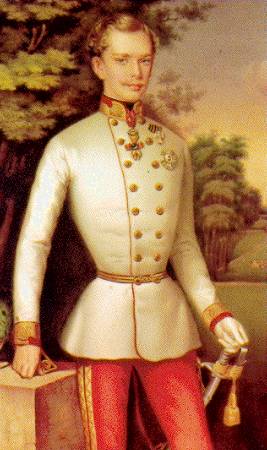November 21
Anniversary of Emperor Franz
Joseph's Death
 |
Franz
Josef was born in 1830. At the age of eighteen he became Hapsburg Emperor
and in 1867, ruler of Austria-Hungary. He was emotionally insensitive
and led a life of myopic
devotion to duty and a constant exercise of form and style
that was rnasquerading
a deep sadness. Following the Rudolf's suicide,
Franz Joseph had many arguments with his nephew and heir, Archduke Franz
Ferdinand, who was assassinated by Serbian nationalists on June 28,.1914 in
Sarajevo. The assassination precipitated a crisis which led to the
outbreak of World War I and the subsequent dissolution of the
Austro-Hungarian Empire. |
|
|
Franz Joseph |
The emperor had to diet to maintain his slim, athletic figure. Dieting was a constant concern because Franz Joseph loved his schnitzel, strudel, and schnapps. His worry about calories made him forego the Viennese passion for schlag (whipped cream), but he often indulged in his favorite dessert, pancakes with brandied fruit. This dessert became the Viennese classic, Kaiserschmarren (Emperor's fluff).
Kaiserschmarren
(Emperor's Fluff)
ingredients
1/4 cup cognac
4 egg yolks
3 TB sugar
pinch of salt
1/4 tsp vanilla
1 tsp orange zest
1 cup flour
6 egg whites at room temperature
4 TB unsalted butter
1/4 cup confectioners' sugar
- Soak raisins in cognac for 30 minutes. Drain and squeeze the raisins dry. Leave the the cognac in a cup.
- Add egg yolks, sugar, and salt together in a bowl.. Beat until mixture thickens and turns pale yellow.
- Stir in milk, vanilla, cognac, and zest. Gradually beat in flour, 1/4 cup at a time, until mixture turns into a smooth batter. Stir in raisins.
- In another bowl, beat egg whites until stiff. Take 1/4 cup of batter and fold it into egg whites. Then take egg whites and carefully fold them completely into batter. Don't overfold.
- Melt 1 TB butter in 8" skillet. Pour in half of batter. Cook over low heat for 4 - 5 minutes until edges begin to brown. With the aid of a spatula, carefully slide pancakes onto a plate uncooked side up.
- Melt another TB of butter in pan. Slide pancake back into pan, uncooked side down. Cook for another 4 - 5 minutes.
- Take 2 forks and pull pancake apart in 6 pieces. Remove to a warn plate and sprinkle with sugar. Repeat procedure with balance of batter. Serve with brandied fruit or plum preserves.